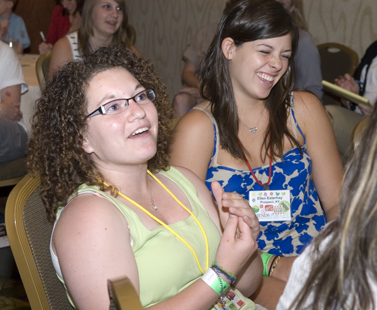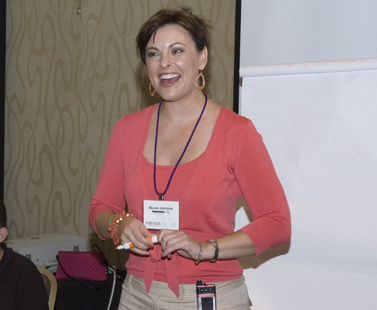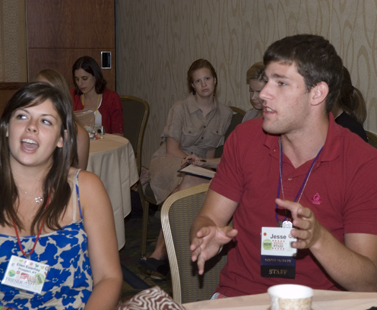Bringing Science Home brings teens, parents together
Maryam Elarbi didn’t know that having Type 1 diabetes would allow her to ask for extra time on the SAT.
But while 16-year-old Maryam was taking the test this year, her blood sugar dropped so low that she had to take a break and eat a snack. She missed about 25 minutes of test time and, because it wasn’t arranged in advance, wasn’t allowed to make it up — a problem that she feels lowered her score.
“It shouldn’t be that we have to keep asking for accommodations,” she complained.
Her audience knew exactly what she meant. The conference room was packed with teenagers who have diabetes and their parents, all there to share their ideas for how USF could best help them as it develops a new project for helping people with chronic disease.

Teens bonded over their frustrations with diabetes at a focus group meeting for USF’s Bringing Science Home project.
The new project, called Bringing Science Home, intends to help people with chronic disease live fuller and more optimistic lives. The project will start by studying Type 1 diabetes, then apply those lessons to other chronic diseases, such as asthma and arthritis. Bringing Science Home is funded by a $5.66 million gift from The Patterson Foundation.
“We don’t know what to create, from a university standpoint, if we don’t know what you want,” said Nicole Johnson, executive director of Bringing Science Home, to the group, which met Wednesday in Orlando at the national conference of Children With Diabetes.
Johnson, who is Miss America 1999, understands what many of these teens and their parents are going through. She was diagnosed with Type 1 herself when she was 19. So Johnson sympathized as the teens griped about overprotective parents, as parents sighed about rebellious teens, and as they all began to understand a little better how diabetes can affect almost every aspect of family life.

Nicole Johnson, executive director of Bringing Science Home, shared some of her own experiences with diabetes.
“My wife and I don’t fight except for diabetes,” said David Garofalo, who has three children, one with diabetes. “She’s more aggressive (about diabetes care) than me, the kids play us against each other — the whole thing gets caught up in diabetes.”
Other parents began to cry as they began to talk about how their children feel depressed and anxious — emotions that they clearly were struggling with themselves.
Sometimes people just don’t realize that dealing with diabetes can be emotionally exhausting, said 18-year-old Ellen Esterhay. People have diabetes every day. There are no vacations, no breaks, and no escape.
“Sometimes it’s just overwhelming,” Esterhay said. “You’ve been holding it together and all of a sudden you’re an emotional train wreck. Sometimes you need someone to talk you through.”
Being the parent of a child with diabetes has its stresses as well. They struggle to balance giving their children independence with their fears that they aren’t caring enough for their health.
Even the smallest transactions of daily routine become fraught with significance: Should you remind your daughter to check her blood sugar? Do you trust that your son has remembered by himself?
“I felt like the diabetes police,” said Linda Monger. “And although I knew harping wasn’t helping, it was hard to let go.”

Teens and their parents came up with a laundry list of suggestions for USF and Bringing Science Home to work on. Among them:
— Blogs for and by teenagers and parents, giving tips and advice about issues they have to deal with.
— Support groups for families.
— Counselors who can help parents and teens work through common conflicts, such as giving teens more independence.
— Better education for medical professionals, so they can provide patients with more useful information and ask better questions.
— A hotline for patients to call on bad days.
— A unified support system to cut through the bureaucracy of diabetes, such as getting accommodations on the SAT and dealing with insurance companies.
All those suggestions will be evaluated, Johnson said. She’s excited about the next steps for Bringing Science Home.
“The need is tremendous for families,” Johnson said. “When the parents started sharing about the needs of their kids, their needs came out, even though they were unstated. I thought that spoke volumes. The intensity and the urgency of their needs are overwhelming.”
– Story and photos by Lisa Greene, USF Health Communications

